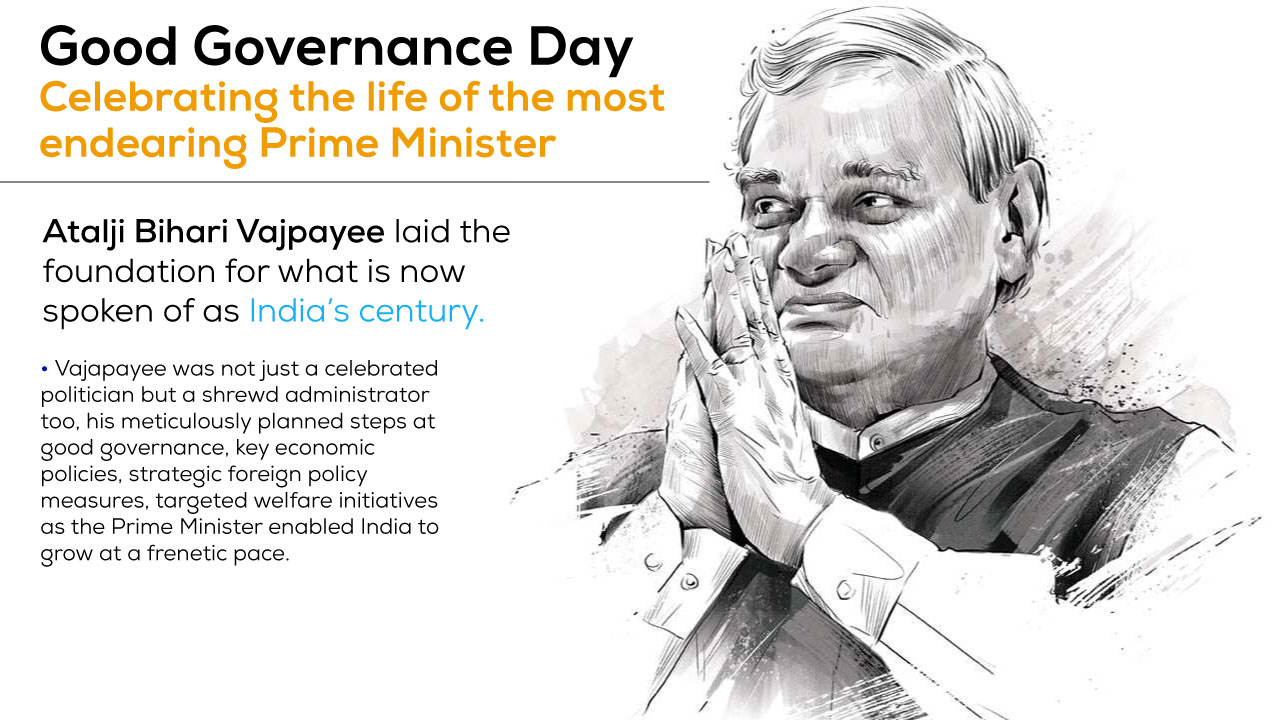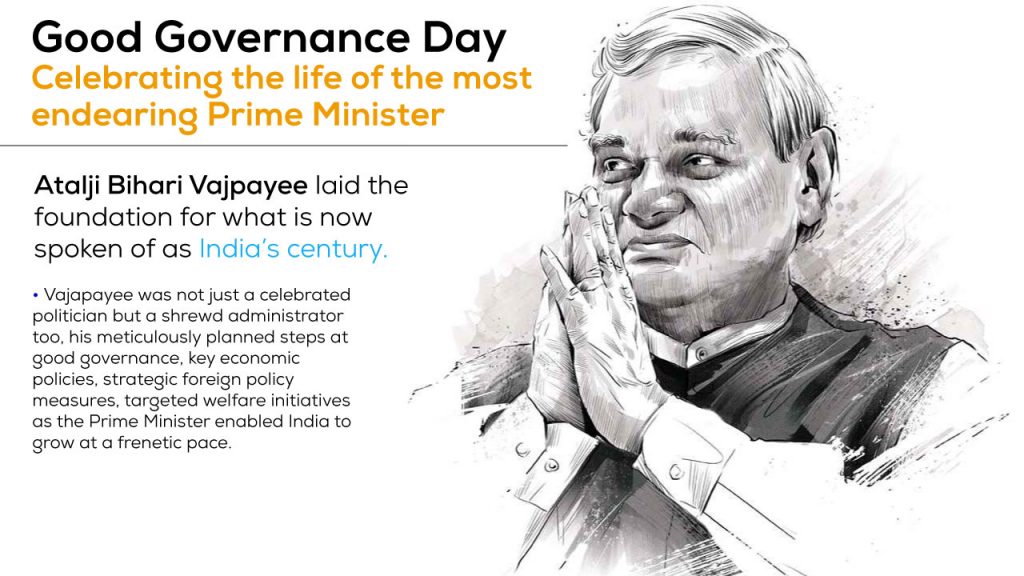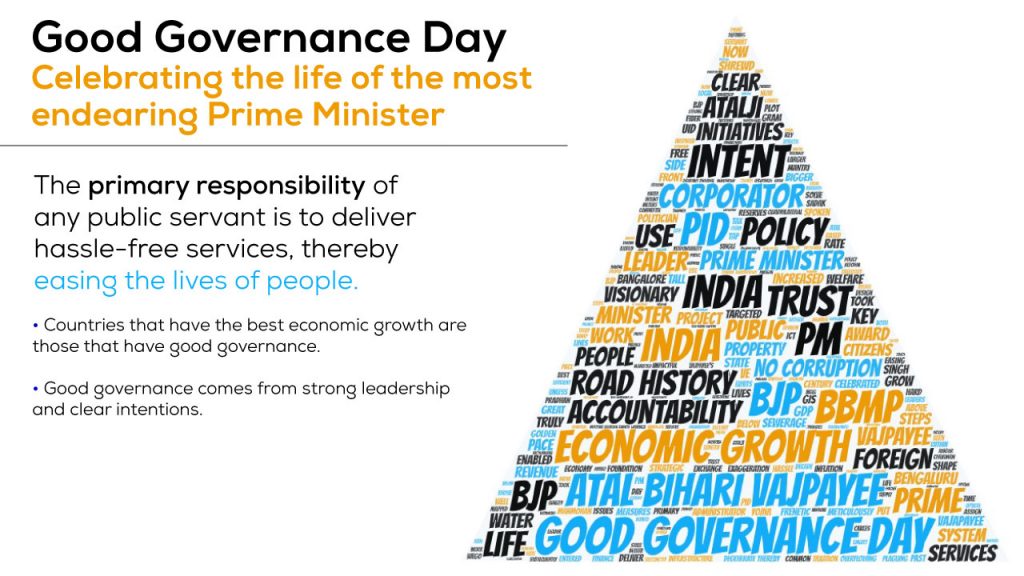Celebrating the life of the most endearing Prime Minister

Celebrating the life of the most endearing Prime Minister

“Today, at 15:45 hours, India conducted three underground nuclear tests in the Pokhran range. The measured yields are in line with expected values. I warmly congratulate the scientists and engineers who have carried out these successful tests.” These iconic words of Atalji in 1998 after the success of Operation Shakthi were a statement of authority, it had pride and grace written all over it.
As a young politically conscious boy in my 20’s, sitting in front of my TV, the sheer grit and determination in his face got me hooked for life. His captivating leadership qualities, mesmerizing oratory, utmost integrity, and above all, his sterling humane qualities like compassion, humility and his remarkable ability to win over adversaries despite ideological differences have all had a profound effect on me in all my years in public life. Under his tenure as Prime Minister, India progressed economically, militarily, and culturally, therefore celebrating Good governance day on his birthday is a fitting tribute to Bharat’s favorite Ratna.
Vajpayee, who held the post of the Prime Minister for three non-consecutive terms in 1996, 1998–99, and from 1999–2004, was the sensitive poet who displayed nerves of steel to conduct the Pokhran-II nuclear tests. The man from humble beginnings envisioned a project as titanic as the Golden Quadrilateral highway network. He was a parliamentarian par excellence. For five decades he contributed to the evolution of India’s rich democratic debates in a manner that has few parallels. When he spoke, the House — and the nation — listened, because he spoke with balance and substance and deliberately eschewed the shrill and shallow partisanship that has increasingly become the hallmark of parliamentary exchanges today. His oratory, replete with pauses and deeply thought phrases in Hindi could mesmerize any audience. As the leader of the Jan Sangh, and later the BJP, he could be a formidable critic. But he took positions on the merits of an issue too and often supported the treasury benches when he believed that this was good for the country. He praised Indira Gandhi for her leadership during the 1971 war with Pakistan, which led to the creation of Bangladesh. He supported P.V. Narasimha Rao and Manmohan Singh when they embarked on the 1991 economic reforms. He was a leader who truly believed in the philosophy – Nation first and politics later.
Vajpayee Ji was not just a celebrated politician but a shrewd administrator too. His meticulously planned steps at good governance, key economic policies, strategic foreign policy measures, targeted welfare initiatives as the Prime Minister enabled India to grow at a frenetic pace. Therefore it is no exaggeration to state that Atalji truly laid the foundation for what is now spoken of as India’s century. His bigger achievements were on the economic front. When Manmohan Singh took over from Vajpayee in 2004, the economy was in great shape — the GDP rate was above 8 percent, inflation was below 4 percent and foreign exchange reserves were overflowing.
Atal Ji’s most impactful achievement is on the road infrastructure side — the Golden Quadrilateral and the Pradhan Mantri Gram Sadak Yojna. The Golden Quadrilateral connected Chennai, Kolkata, Delhi, and Mumbai through a network of highways while the Pradhanmantri Gram Sadak Yojna was planned as a network of all-weather roads for unconnected villages across India. The BJP government of the day building on the legacy left by Atalji has already built over 6lakh km of roads, connecting the rural inhabitants to mainstream networks. Both the projects proved to be an immense success and contributed to India’s economic growth majorly. Vajpayee’s commitment to reducing the government’s role in running businesses and industry was reflected in the formation of a separate disinvestment ministry. The most important disinvestments were Bharat Aluminum Company (BALCO), Hindustan Zinc, Indian Petrochemicals Corporation Limited, and VSNL. The Vajpayee government made another beginning by introducing the Fiscal Responsibility Act that aimed to bring down the fiscal deficit. It boosted public-sector savings which rose from -0.8% of GDP in FY 2000 to 2.3% in FY 2005. The Vajpayee government’s New Telecom Policy unleashed the telecom revolution in India by replacing fixed license fees for telecom firms with a revenue-sharing arrangement. The creation of the Telecom Dispute Settlement Appellate Tribunal also separated the government’s regulatory and dispute settlement roles.

The primary responsibility of any public servant is to deliver hassle-free services, thereby easing the lives of common people. Inspired by Atalji and other tall leaders of BJP, I entered public life as a corporator, with a clear intent to solve the larger issues plaguing the city of Bengaluru. But plans are only good intentions unless they immediately degenerate into hard work. As a member of the BBMP committee for taxation and finance and subsequently its chairman, we worked tirelessly to design a GIS-based Property Identification(PID) number system to assign every single plot within the BBMP limits a unique number. To succinctly put it, PID for properties is tantamounts to what the UID( Aadhar ) number is for the citizens of India. PID in my opinion is the most defining reform BBMP has undertaken in the past decade for the revenue of the corporation has been increasing manifold year after year. The snowball effects of this invention have been the most rewarding to me. Unique Road history project that mapped every road in the city and optical fiber cables laid through the length and breadth of Bengaluru have used the PID database to render efficient services to the people. Over the years, Bangalore Water Supply and Sewerage Board(BWSSB) has superimposed unique PID numbers with water meters and has achieved near-universal coverage. This has also increased its revenue by imposing a tax on sewerage lines as well as regularizing unauthorized tap connections in the city. The World e-governments Organization of Cities and Local Governments(WeGO) awards that promote smart initiatives that use ICT to improve the quality of life of citizens recognized the PID system project and this illustrious award was bestowed on the Bangalore city corporation. We’ve seen over time that countries that have the best economic growth are those that have good governance, and good governance comes from strong leadership and clear intentions, both of which have been the hallmark of the BJP government. I pray to God every day to give me the moral strength to walk in the path shown by Atalji, following his values and conduct.